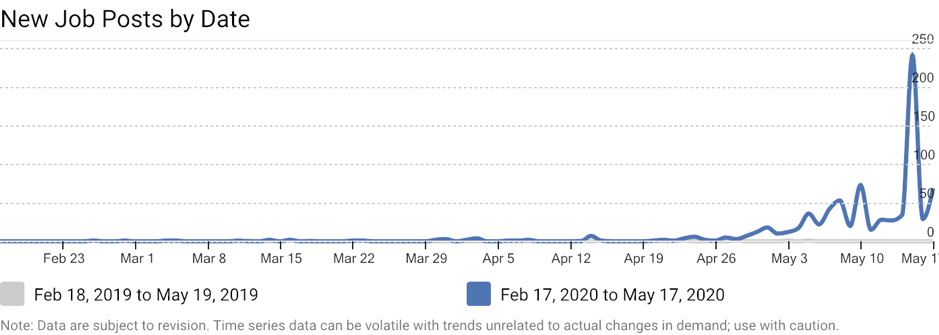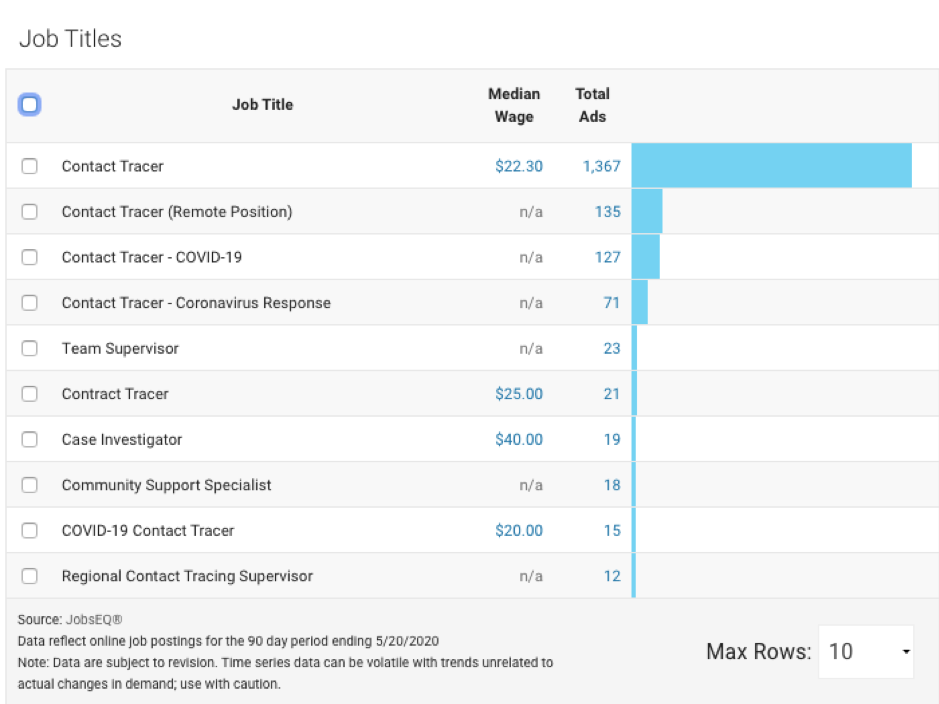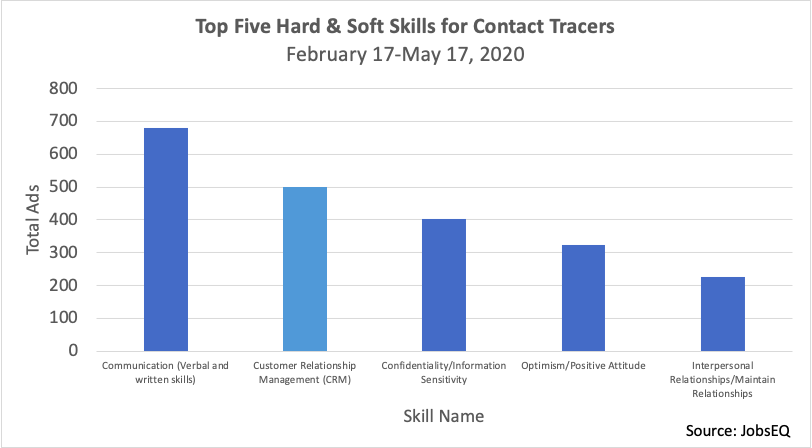What Does it Take to Become a Contact Tracer?

By Chmura Economics & Analytics |
What does it take to become a contact tracer?
Contact tracing is quickly being recognized as one of the most effective ways of combatting the spread of COVID-19. Countries like Singapore[1] and South Korea[2] have used contact tracing to track down potentially infected persons and cut down on the spread of COVID-19. The urgent need for contact tracing has created an entirely new job title: contact tracer.
In this blog, I use Chmura’s job postings data in JobsEQ Real Time Intelligence (RTI) to investigate the emergence of contact tracers. What exactly do contact tracers do? When did the spike in online job ads for contact tracers begin? How much are contact tracers paid? And what skills and certifications are needed to become a contact tracer?
What does a contact tracer do?
First, it is important to understand what a contact tracer actually does. According to Johns Hopkins University’s online course on Contact Tracing for COVID-19 Prevention, “the point of contact tracing is to find people who have been in contact with an infected person, and ask them to stay home so they don’t infect anyone else.”[3]
Contact tracers call people infected with COVID-19, connect them with treatment and social support, and provide isolation instructions. Importantly, tracers also find out who the infected person was in contact with during their infectious period. Then the contact tracer will call the case’s contacts to notify them they may have been infected and provide quarantine instructions. Contact tracers also check in with their cases regularly until their isolation or quarantine ends.
To be a contact tracer, you have to be able to present information clearly and with empathy—and that is exactly what the job postings data supports.
Using job postings data
JobsEQ by Chmura’s RTI analytic is perfect to track the emergence of the new job of contact tracer. RTI pulls thousands of online job ads from hundreds of sites on a daily basis and then deduplicates the ads, and provides information on skills, wages, and more. I searched for all online job ads in the United States posted in the last three months that included the keywords “contact tracer” or “contact tracing.” This search found all jobs that include these keywords in the text of the job description, not only jobs with “contact tracer” in the title.

In this time series chart, it is clear that until late April 2020, there were few online ads for contact tracing jobs in the United States. April and May have seen a sharp uptick of job posts mentioning contact tracing, for a total of 2,279 new job posts in the past three months. Unsurprisingly, the majority of these job postings have titles like “contact tracer.”

The median hourly wage for “medical secretaries” that include the keywords “contact tracer” or “contact tracing” is $21.80/hour. This is both higher than the minimum wage in all states and higher than the median wage of medical secretaries that don’t include the keywords “contact tracers” or “contact tracing.”
Optimism and empathy wanted
What does it take to be a contact tracer? You might suspect contact tracers need to have a degree in nursing or a certification in public health. But surprisingly, the data shows that the most in-demand skill for contact tracers is…communication skills.
Only 2.1% of job ads required the applicant to be a Licensed Practical Nurse (LPN) or a Registered Nurse (RN). Further, the only “hard skill” that was commonly asked for was “Customer Relationship Management,” which was requested on 22.0% of job ads. Soft skills like communication (verbal and written), information sensitivity, optimism, and empathy outperformed hard skills.

This chart shows the top five most requested skills for contact tracers. The only hard skill that made even the top ten most requested skills was “Customer Relationship Management,” which also relates to interpersonal skills. This lone hard skill is marked in a lighter blue. Moreover, these soft skills proved to be more in demand than education requirements. Only 8.7% of job posts requested a high school diploma, and only 10.5% of jobs requested an associate’s degree or higher.
Who’s hiring?
So, contact tracers are paid over minimum wage and must excel at clear communication and empathy. But who is hiring contact tracers?
One organization, Contrace, is responsible for nearly half of all contact tracer job postings. According to its website, Contrace Public Health Corps is a nonpartisan social enterprise located in Washington, DC that is working to help fight COVID-19 by hiring “an army of 60,000 qualified contact tracers.”[4] Other employers include public health departments, healthcare service agencies and providers, and consulting groups.
New pandemic jobs?
COVID-19 has been wreaking havoc on the US job market, as we’ve tracked in our COVID-19 blog series. Yet as the US society and economy changes, we should expect entirely new jobs, like contact tracers, to emerge. Looking at online job postings, like JobsEQ RTI, is an excellent way to stay on top of the changing job market.
And if you’re looking for a job…you might want to check out becoming a contact tracer.
[1] https://www.cnet.com/health/director-behind-singapores-contact-tracing-app-says-tech-isnt-the-solution-to-covid-19/
[2] https://www.theguardian.com/world/2020/apr/23/test-trace-contain-how-south-korea-flattened-its-coronavirus-curve
[3] https://www.coursera.org/learn/covid-19-contact-tracing?edocomorp=covid-19-contact-tracing#about
Subscribe to the Weekly Economic Update
Subscribe to the Weekly Economic Update and get news delivered straight to your inbox.












